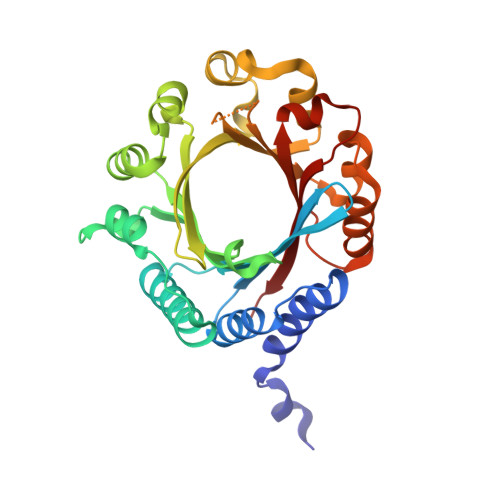A Single Amino Acid Switch Alters the Isoprene Donor Specificity in Ribosomally Synthesized and Post-Translationally Modified Peptide Prenyltransferases.
Estrada, P., Morita, M., Hao, Y., Schmidt, E.W., Nair, S.K.(2018) J Am Chem Soc 140: 8124-8127
- PubMed: 29924593
- DOI: https://doi.org/10.1021/jacs.8b05187
- Primary Citation of Related Structures:
6PGM, 6PGN - PubMed Abstract:
Mutation at a single amino acid alters the isoprene donor specificity of prenyltransferases involved in the modification of ribosomally synthesized and post-translationally modified peptides (RiPPs). Though most characterized RiPP prenyltransferases carry out the regiospecific transfer of C 5 dimethylallyl donor to the side chain atoms on macrocyclic acceptor substrates, the elucidation of the cyanobactin natural product piricyclamide 70005E1 identifies an O-geranyl modification on Tyr, a reaction with little prior biochemical precedence. Reconstitution and kinetic studies of the presumptive geranyltransferase PirF shows that the enzyme utilizes a C 10 donor, with no C 5 transferase activity. The crystal structure of PirF reveals a single amino acid difference in the vicinity of the isoprene-binding pocket, relative to the C 5 utilizing enzymes. Remarkably, only a single amino acid mutation is necessary to completely switch the donor specificity from a C 5 to a C 10 prenyltransferase, and vice versa. Lastly, we demonstrate that these enzymes may be used for the chemospecific attachment of C 5 or C 10 lipid groups on lanthipeptides, an unrelated class of RiPP natural products. These studies represent a rare example where prenyl donor specificity can be discretely altered, which expands the arsenal of synthetic biology tools for tuning biological activities of peptide natural products.
Organizational Affiliation:
Department of Medicinal Chemistry , University of Utah , Salt Lake City , Utah 84112 , United States.














